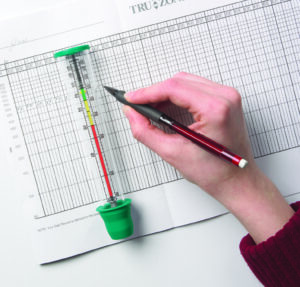How It Works
Peak Flow Monitoring and Symptom Monitoring
Although ‘self-monitoring’ techniques can be effective for some, there is a general inclination for patients to underestimate the severity of their everyday asthma symptoms.1 Unlike symptom monitoring, which may help patients rate and classify their symptoms, use of a TRUZONE® Peak Flow Meter gives a more objective and accurate measurement of how asthma may be affecting their lung function; Often acting as an early warning of decreasing function before the patient ever feels short of breath or are experiencing other symptoms.
The Practical Allergy (PRACTALL) consensus report on the state of asthma education and treatment guidelines for children, emphasized the need to involve the child and/or their parent/caregiver in education about their disease. The report recommended using tools specifically designed for people who are not intimately familiar with the disease to help track and monitor asthma at home.
Peak Flow based action plans:
- Gives objective and accurate measurement of lung function
- Provides patients with clear zones of control for modifying medications
- Allow patients to be active participants in their therapy
- May help track and identify triggers
- May help identify when lung function is getting worse – even before symptoms arise
- Can be a psychological support for patients

 PRECISION, ACCURACY, AND REPEATABILITY
PRECISION, ACCURACY, AND REPEATABILITY



